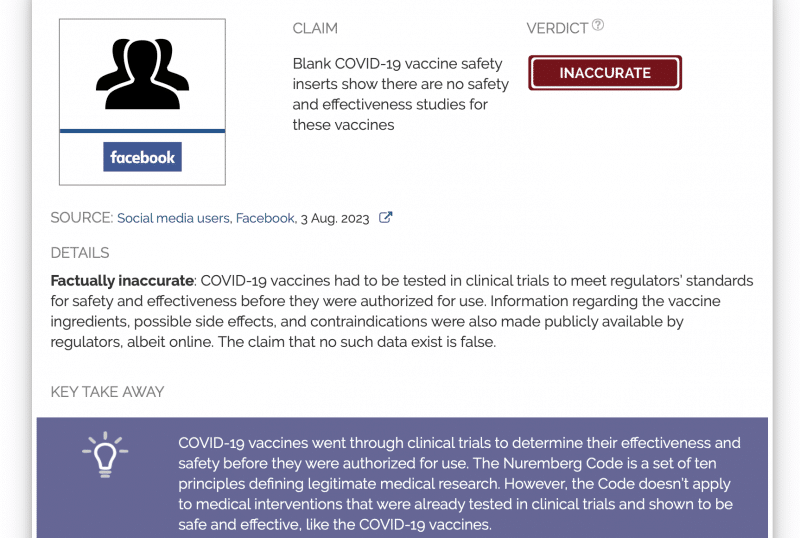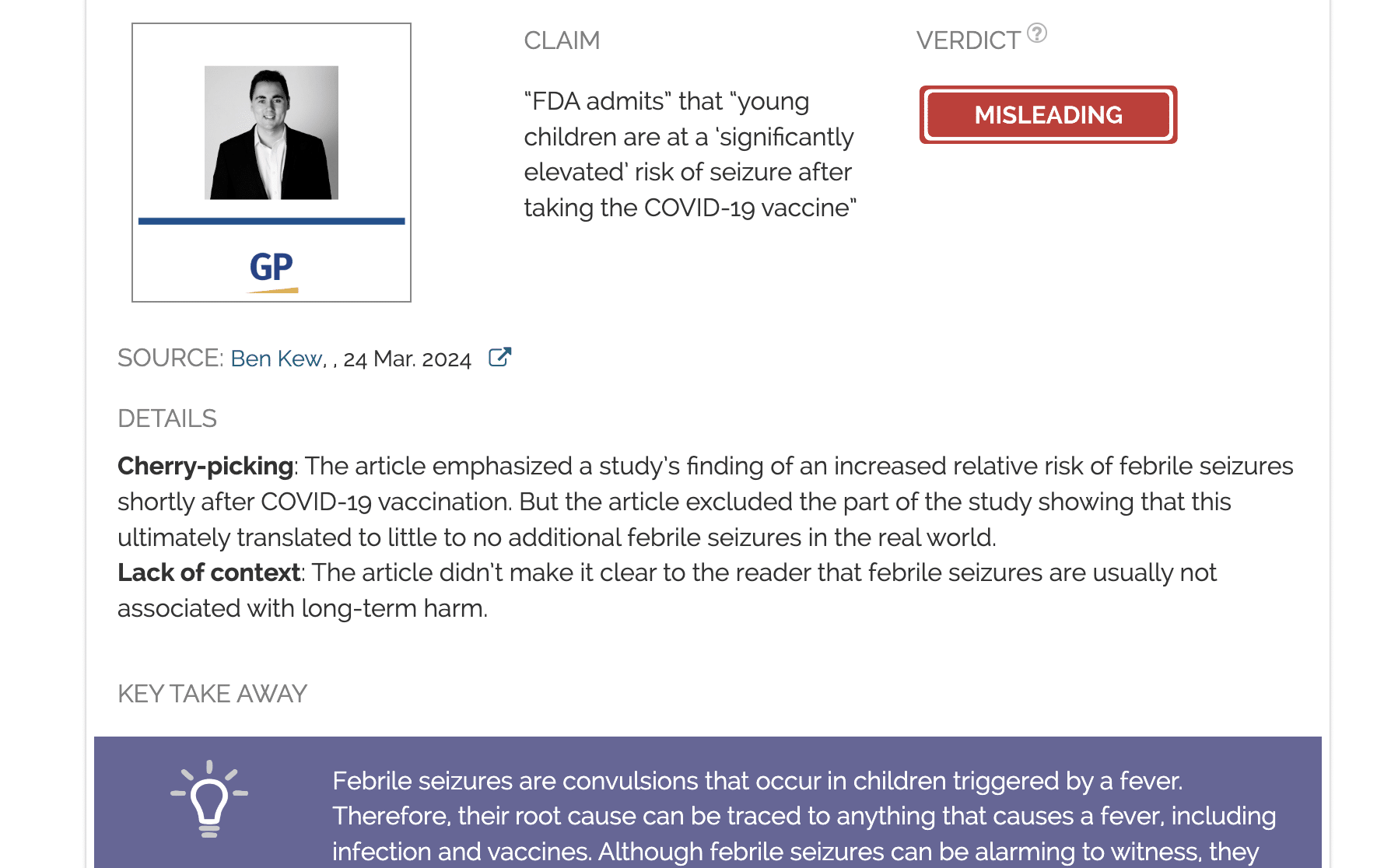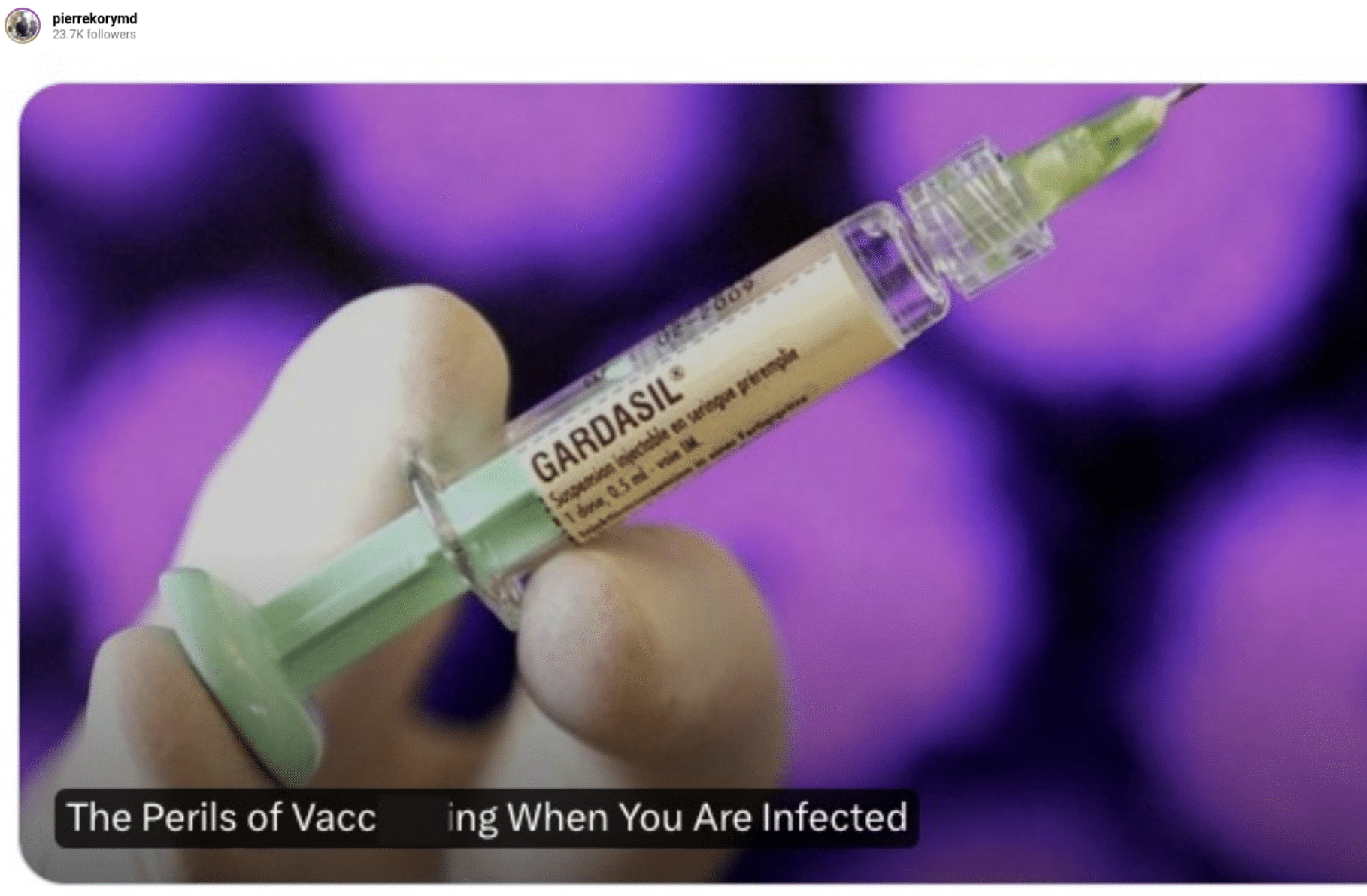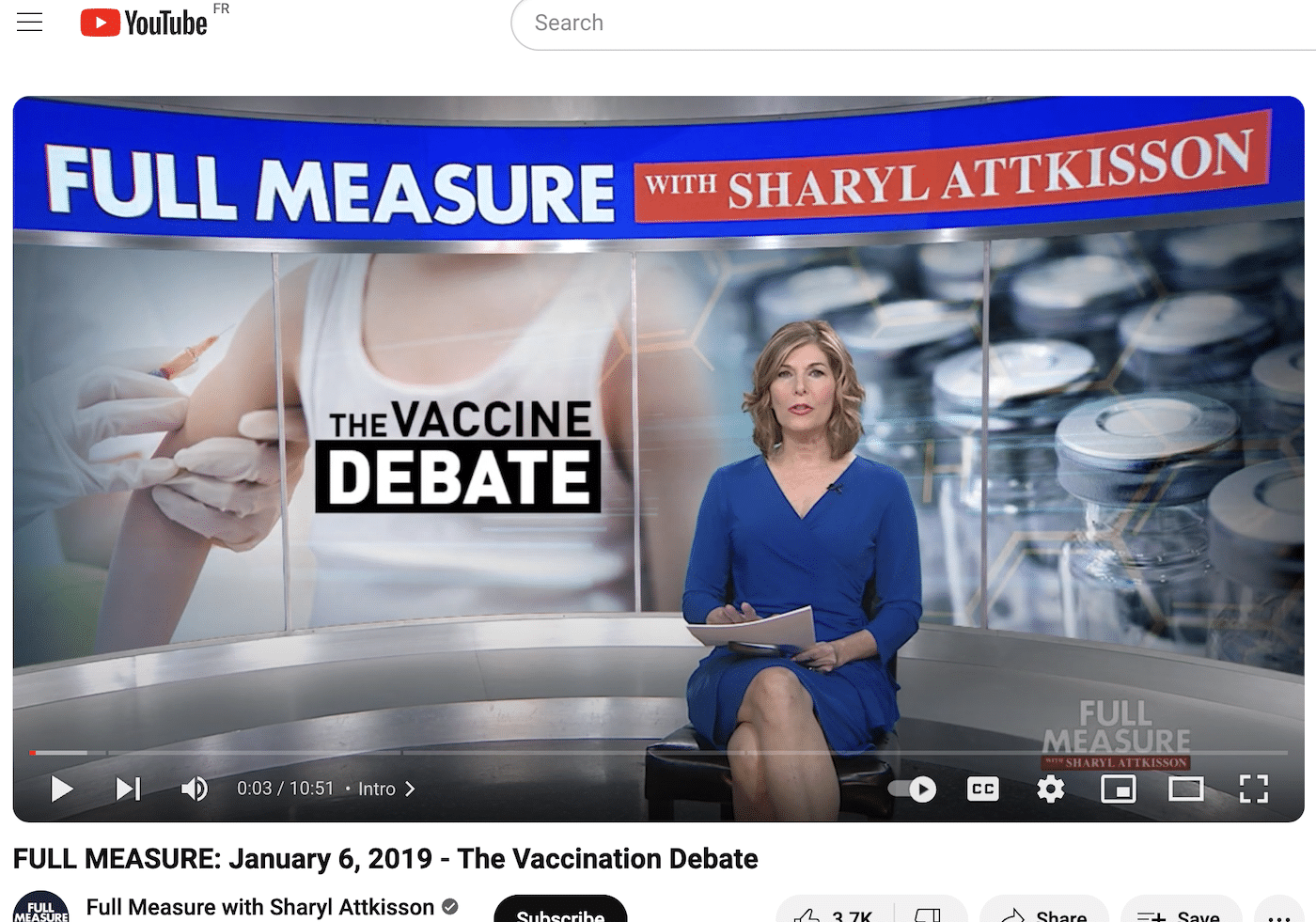- Health
Video about blank COVID-19 vaccine insert falsely implies there are no safety data for COVID-19 vaccines
Key takeaway
COVID-19 vaccines went through clinical trials to determine their effectiveness and safety before they were authorized for use. The Nuremberg Code is a set of ten principles defining legitimate medical research. However, the Code doesn’t apply to medical interventions that were already tested in clinical trials and shown to be safe and effective, like the COVID-19 vaccines.
Reviewed content

Verdict:
Claim:
Blank COVID-19 vaccine safety inserts show there are no safety and effectiveness studies for these vaccines
Verdict detail
Factually inaccurate: COVID-19 vaccines had to be tested in clinical trials to meet regulators’ standards for safety and effectiveness before they were authorized for use. Information regarding the vaccine ingredients, possible side effects, and contraindications were also made publicly available by regulators, albeit online. The claim that no such data exist is false.
Full Claim
“How is it informed consent when all of the [...] placebo safety studies are not listed from their manufacturer?”; “If we don’t know what we’re injecting into ourselves, I don’t understand how that’s informed consent.”
Review
A Facebook reel posted on 3 August 2023 showed a person speaking to a CVS pharmacist, asking for COVID-19 vaccine inserts. Upon finding a blank sheet of paper except for text indicating the paper was left “intentionally blank”, the person asked “How is it informed consent when all of the […] placebo safety studies are not listed from their manufacturer?” and claimed that it showed people “don’t know what we’re injecting into ourselves”.
The pharmacist said that the COVID-19 vaccines were safe, to which the person replied “What studies are you going by that states that it’s safe and effective?” They followed up by asking the pharmacist, “You know about the Nuremberg trials, right?”
The reel was viewed more than 48,000 times.
Overall, the video implies that there isn’t actually any data about the safety and effectiveness of the COVID-19 vaccines and so people are unable to give informed consent. Implications to the same effect were also made by others, including U.S. Senator Ron Johnson. “Nuremberg trials” are also commonly invoked by those implying that COVID-19 vaccination constitutes human experimentation.
However, COVID-19 vaccines went through the necessary studies to determine their effectiveness and safety before they were authorized for use, rendering this implication inaccurate and misleading. We explain below.
Inaccurate to claim there’s no safety and effectiveness studies on COVID-19 vaccines
In order to acquire Emergency Use Authorization, vaccine manufacturers had to submit data from clinical trials demonstrating the safety and effectiveness of the vaccines. The results for the first vaccines to be authorized (the Pfizer-BioNTech and Moderna COVID-19 vaccines) were also published in peer-reviewed journals not long after authorization and are publicly available to read online[1,2].
Earlier fact-checks by Reuters and AFP reported that blank COVID-19 vaccine inserts aren’t evidence that there aren’t any safety or effectiveness studies about the vaccines. FDA spokesperson Alison Hunt told AFP that information for approved vaccines is provided in package inserts. But in the case of the authorized vaccines, the information was communicated via patient Fact Sheets that were posted on the FDA website.
Hunt added that “Fact Sheets typically are not shipped with the vaccine”, but “the vials of the vaccines feature QR codes that providers of the shots can use to download the latest available information.
In the case of the Johnson & Johnson COVID-19 vaccine, the company explained that the insert was left blank except for a QR code and a website address, so that “vaccinators and consumers have the most up-to-date Fact Sheets available to them, with www.vaxcheck.jnj reflecting any revisions made in alignment with the FDA,” a Johnson & Johnson spokesperson told Reuters, adding that “The Fact Sheets contain detailed prescribing information, including ingredients, dosage and administration, warnings and contraindications”.
Fact-checking group Lead Stories also covered this claim. The group reported that “Under federal law, patients must receive a CDC-written Vaccine Information Statement (VIS) with an overview of a vaccine’s risks and benefits before they receive an immunization”. While authorized vaccines don’t come with a VIS, the Fact Sheet (discussed above) takes its place.
Dozens more studies demonstrating that the COVID-19 vaccines are safe have since been published following the vaccines’ authorization, documented by the U.S. Centers for Disease Control and Prevention on its website and listed according to the year of publication and the population studied.
Why the Nuremberg Code doesn’t apply to COVID-19 vaccination campaigns
The Nuremberg trials took place between 1945 and 1946, charging multiple Nazi Germany leaders with war crimes. Among these was the Doctors’ Trial (officially the United States of America vs. Karl Brandt et al.), which was prosecuted against 23 doctors and administrators accused of war crimes and crimes against humanity in the form of medical experimentation on concentration camp inmates.
Several of the doctors had argued in their defense that “no international law or informal statement differentiated between legal and illegal human experimentation”. This defense motivated two U.S. doctors, Andrew Ivy and Leo Alexander, who had worked with the trial’s prosecution, to create a memorandum outlining six defining characteristics of legitimate medical research. This was later revised into ten points that are now known as the Nuremberg Code.
While the Code has heavily influenced the way we think about medical ethics, it isn’t legally binding or enforceable. Nor is it the only set of guidelines on medical experimentation: there are also the Declaration of Helsinki, which was adopted in 1964, and UNESCO’s Universal Declaration on Bioethics and Human Rights.
But the choice of anti-vaccine groups to cite the Nuremberg Code may be a deliberate one. Those opposed to COVID-19 vaccination have invoked language relating to the Holocaust, including the Nuremberg trials, possibly to exploit the emotional appeal associated with Nazi atrocities.
However, this tactic is misguided because COVID-19 vaccination for the public doesn’t violate the Nuremberg Code. Firstly, the Code applies specifically to experimentation and the clinical trials were conducted according to regulations. Secondly, since the vaccines were already tested during clinical trials to ensure their safety and effectiveness, they were no longer experimental once they were made available to the public.
Alexis Paton, the chair of ethics for the U.K. Royal College of Physicians, told Full Fact:
“The Nuremberg Code is about the active experimentation on humans, for the most part during some sort of clinical trial of some description. So when we talk about Pfizer or AstraZeneca [vaccines], we’re out of the auspices of the Nuremberg Code because this is a product that has been trialled, with appropriate ethics in place, and has been approved and is now in production and being used globally”.
Emma Cave, a professor in healthcare law at Durham University, pointed out that the concept of informed consent is different with regards to research and treatment: “The Nuremberg Code relates to research, where the emphasis of informed consent requirements is on preventing the research participants from being used as a means to an end”.
In contrast, “Informed consent for treatment serves a slightly different purpose. It prevents a battery or negligence, and protects the autonomy rights of the patient,” she said.
The appropriation of language related to the Holocaust to describe COVID-19 vaccination and public health measures also has the potential to inflict harm. Reports of harassment and threats against healthcare workers multiplied during the pandemic, and the alleged violation of the Nuremberg Code, despite being unfounded, has been used as a basis for issuing death threats to healthcare workers, placing them at risk of physical harm.
Imanuel Baumann, a historian and the head of the Memorium Nuremberg Trials, told German news outlet Belltower.News: “If you put the Shoah side by side with policies implemented during the pandemic, you are trivialising the crimes of the Nazi regime.”
UNESCO and the International Holocaust Remembrance Alliance issued a joint statement calling such appropriations “clearly false, inappropriate and grossly offensive to the victims and survivors of the Holocaust”, warning that Holocaust distortion desensitizes “people to the Holocaust and its legacy”.
REFERENCES
- 1 – Polack et al. (2020) Safety and Efficacy of the BNT162b2 mRNA Covid-19 Vaccine. New England Journal of Medicine.
- 2 – Baden et al. (2021) Efficacy and Safety of the mRNA-1273 SARS-CoV-2 Vaccine. New England Journal of Medicine.



